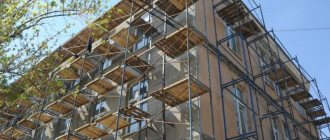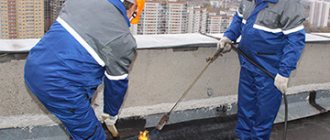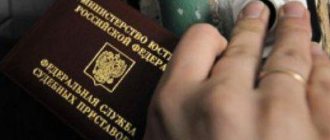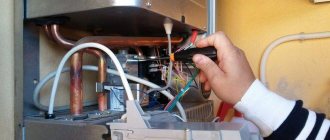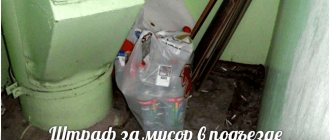Home / Apartment / In a new building
When purchasing living space in a new building, many owners are confident that for a certain time they will be free from payments to the Housing Capital Repair Fund. And the more unexpected it becomes for them to receive payment documents from the above-mentioned Fund with the amounts due for payment. Property owners have reasonable questions about when they start paying for major repairs in a new building, and whether the actions of territorial authorities are legal in relation to buildings that are less than 5 years old from the date of commissioning.
Why are they collecting money for major repairs?
Since 2013, residents of the Russian Federation have received new payment receipts for major repairs in high-rise buildings. In 2012, amendments and additions were made to the Housing Code of the Russian Federation stating that ensuring the repair of multi-storey buildings falls entirely on the owners. Over the next 2 years, contributions began to be introduced in different regions of the country.
In megacities and towns, the established tariffs and timing of repairs differ. Since most residential buildings in the Russian Federation were built more than ten years ago, money from contributions goes to improve living conditions and home safety. Renovation of apartment buildings requires significant investments, so it was decided that contributions would accumulate gradually.
Major repairs require restoration of characteristics according to standards, therefore the program includes:
- Replacement of building structures in whole or in parts.
- Strengthening and repairing balconies.
- Strengthening the foundation.
- Replacing elevators.
- Roof repair.
- Insulation of the facade if necessary.
Non-profit regional funds are engaged in accumulating repair contributions. The first in line for major repairs are the oldest, most worn-out buildings. Renovations on newer homes are being delayed until 2030. On the “housing and communal services reform” website you can find out when the turn of a particular house will come, how much money has already been collected for its repairs and how much remains to be saved.
Who is obliged to pay
The main category of persons who are required to pay contributions for major repairs by region are the owners of rooms and apartments in an apartment building. Such objects include houses with more than 3 apartments. Payment of fees applies to all owners - even legal entities. Moreover, it does not matter whether they have a living space or not. The municipality pays for apartments that are municipally owned. Even the state is forced to pay fees for premises that are state-owned.
If the owner has accumulated debts on contributions, then the obligation to pay them is transferred to the new owner. Only those people who own houses can avoid paying contributions:
- designated as unsafe and subject to demolition;
- withdrawn from the housing stock for the needs of the municipality and the state.
Those persons who rent an apartment or room do not pay money for the renovation of the building. This is the direct responsibility of the owner.
The amount of contributions is set locally by the constituent entities of the Russian Federation. In this case, a minimum monthly amount is assigned. But building residents have the right to independently request an increase in payment if they need additional services or want to make repairs faster.
What benefits are provided when paying contributions for major repairs?
According to Federal legislation, some categories of citizens may be fully or partially exempt from paying contributions for major repairs. It is important to remember that the list of persons who are entitled to such a benefit is formed by the regional government and can be changed by introducing additional items or deleting existing ones. Basically, subsidies are provided to citizens who have low-income status or meet certain criteria. Compensation is provided:
- single pensioners over 80 years of age who are completely exempt from paying the contribution;
- single elderly people over 70 years of age are entitled to pay 50% of the established contribution amount;
- Disabled children, their parents, as well as adults with group 1-2 disabilities are provided with a payment of 50% of the accrued amount.
Benefits are provided on the basis of a written application from the owner to the department of the territorial Capital Repair Fund, and upon presentation of documents proving the right to receive them.
In addition, in cases where home owners paid for major repairs over a certain period, and then the house was declared unsafe and was included in the list for demolition, residents have the right to a refund of the paid funds in full (if the meeting of owners decided not to redirect these funds for demolition of the building).
Beneficiaries
Tenants and residents of buildings subject to demolition or transferred to the state do not pay contributions, although they are not classified as beneficiaries.
The preferential categories that have the right to receive compensation or not pay contributions for major repairs by region include the following owners:
- Large families.
- Non-working pensioners under 70 years of age. They are compensated for 50% of their contributions, and pensioners aged 80 years and older receive a full refund of the funds spent.
- Disabled people of groups 1 and 2 and families raising a disabled child.
- WWII veterans.
- Persons who have been exposed to radiation.
- Low-income families. In this case, payments are included in utilities when calculating subsidies.
- Labor veterans.
- Victims of repression who were rehabilitated.
But exemption from payment of money and compensation of contributions are not the same thing. Those who are exempt from fees do not pay them. Beneficiaries must make a payment, but later the state returns them the full amount or part of it.
Conclusions and useful video
Families who do not own real estate and residents of dilapidated houses may not pay for future work to restore the house to its previous condition. The acquisition of treasured square meters in a recently erected building does not relieve the need to form a fund.
More detailed information can be found in the following video.
The addition of the concept of “new building” to housing legislation did not protect owners from the obligation to pay receipts for major repairs, but allowed them to count on receiving a deferment after approval of the application by the housing inspectorate.
The developer's warranty obligations to eliminate all deficiencies identified within 5 years from the date of putting the residential building into operation should not be taken as an exemption from paying for major repairs. Dues are part of your housing payments, so ignoring receipts and deadlines can make matters worse. Citizens belonging to one of the preferential categories can apply to the MFC for compensation.
How to get compensation
To apply for compensation of funds from contributions for major repairs, visit the state administration with the following package of documents:
- application form - the staff will tell you how to write it;
- citizenship of the owner of the property and other people who live in it;
- a document that indicates the right to benefits - a pension or benefit certificate;
- receipts that confirm payments for major repairs;
- a document confirming the number of family members;
- certificate of absence of debts for payment of housing and communal services for the previous period.
You can also submit these documents to the MFC or on the State Services portal.
Consequences of non-payment
The Housing Code of the Russian Federation states that homeowners are required to pay contributions for major repairs of the building. Article 155 of the RF Housing Code establishes fines for debtors: a penalty of 0.025% of the total debt for each overdue day.
Contributions for major repairs are classified as utility services, therefore, in case of non-payment, they resort to various measures of influence on the debtor:
- litigation;
- arrest;
- seizure of property;
- ban on leaving the Russian Federation.
In 2021, according to statistics, an average of 90% of citizens in the country pay the contribution money. But for each individual region the indicators are different: in Crimea, 44% of owners pay money, and in Perm - more than 100%. This result was achieved due to the fact that citizens pay not only current contributions, but also accumulated debts on payments for major repairs.
The Supreme Court of the Russian Federation confirmed the legality of collecting funds for repairs, taking into account current legislation. Therefore, in almost all situations, the court supports the fund to collect money, and not the citizens who refuse to pay.
Legislative aspect of the issue
Funds are collected for the Fund for Major Repairs of Common Property, in accordance with the requirements of the Housing Code of the Russian Federation, from all owners of premises located in a residential apartment building. This applies to both owners of residential and non-residential premises.
The size of the fee is determined taking into account the area of the home and the value of the territorial coefficient used in the calculation using the formula: k*n=S, in which k is the cost of repairs of 1 sq. m. meters of premises established in the region, and n is the area of housing owned, that is, privatized by the owner.
As a rule, the amount of the minimum contribution has its own meaning in different regions and is calculated individually for each household based on a technical examination of the building.
Is there an alternative
There are no other payment options for major repairs. But, if a citizen has reasons not to trust the fund, he can use an alternative method of saving money:
| Type of accumulation | Peculiarity |
| Fund operator account by region | The regional operator transfers funds under the program. It is used to identify houses based on their condition and set the amount of fees. This method is installed for those buildings that are already close to emergency conditions. |
| Special account for house residents | The money is kept in the account until repairs are carried out. Residents independently decide what to spend the accumulated funds on. They can negotiate a higher rate for faster repairs or for additional general house needs. |
If residents did not vote on the payment method or there were more votes for the first option, then homeowners pay the receipts and deposit funds into the operator’s account. If the majority of owners have chosen a special account, then residents are approved for this method of making payments. At the same time, residents also receive receipts, they pay for them, but the money is sent to their special account.
To accumulate funds for major repairs, an account is opened in a bank. The owners decide among themselves on what purposes to spend the money. After completing the work, the bank, by order of authorized persons, transfers funds for settlement with the team of workers and with suppliers of building materials.
How are funds transferred to the Capital Repair Fund spent?
The main indignation of residents of new buildings is caused by the fact that payments for major repairs have to be made at the moment when the house has the status of new and is under warranty from the developer, that is, it will not require serious repairs in the foreseeable future. In this case, it is necessary to take into account that by sending contributions to the territorial Fund, the owners contribute to the accumulation of the total amount of funds for major repairs of all apartment buildings in the region. That is, the money goes into the so-called “common pot”, from where it will be transferred to the households that are first in line for reconstruction.
Amendments made to the Housing Code in 2021 make it possible to change this scheme for accumulating and spending funds. According to the innovations, by decision of homeowners, the formation of savings for major repairs can be carried out targeted, for the needs of a specific building. To do this, owners of residential premises in apartment buildings need to take the following actions:
- a general meeting of residents to decide to open an individual personal account where money will be transferred for major repairs of the building;
- determine the amount of monthly contributions (their amount should not be less than that established in the region);
- appoint a representative who will, by decision of the residents, manage the funds (this could be a management company, a homeowners association or a territorial Capital Repair Fund);
- determine the approximate time for major repairs of common premises.
The advantages of this method of accumulating funds for major repairs of a building are obvious. The main thing is that the funds in the account are managed by the owners, who independently decide on the timing and scope of work to repair the housing stock.
In addition, apartment owners in apartment buildings themselves select contractors, carry out quality control and acceptance of completed work. With this form of payment for major repairs, you can be sure that the funds collected by residents will be used for their intended purpose. You can withdraw money from your account only for major repairs if you provide documents confirming the intended use of the funds.
The need to pay for major repairs to residents of new buildings
Article 170 of the Housing Code of the Russian Federation, paragraph 5.1, establishes the procedure for paying funds for major repairs for residents of new buildings. According to this clause, owners of apartments in houses built after the advent of the program for payments for major repairs begin to make contributions only after a certain period.
For a maximum of 5 years, the building is under the developer's guarantee, and he must carry out repair work. But this period is determined individually for each building in different regions. Typically this period is only 12 months. After the warranty period expires, owners begin to receive receipts for payment for major repairs.
Deferment of contributions for major repairs
Many owners of apartments purchased during the construction phase or immediately after its completion are reluctant to pay contributions for major repairs. There is no need to be surprised, because the house has just been put into operation, and the developer guarantees that within 5 years he will eliminate at his own expense any deficiencies that appear. What kind of restoration work can we talk about?
Attention! If the house is completely new, then the officially reflected opinion of the majority of owners may serve as the basis for filing a petition to delay the start of collecting funds for future restoration work. The housing inspection is responsible for reviewing applications.
Experts assess the condition of the apartment building and consider the arguments given by the residents. As a result, a permit or written refusal is issued indicating the reasons. Owners of real estate located in an apartment building that has been in operation for more than 5 years cannot request a postponement of the start date for collecting funds for major repairs.
A home owner who decides to ignore receipts with the amount of payment for major repairs runs the risk of repaying the debt, increased by the amount of the penalty (1/300 of the Central Bank key rate). The condition is enshrined in Art. 255 Housing Code of the Russian Federation. A significant delay may result in legal action. The basis for collecting the amount of debt will be a writ of execution.
Minimum payment for major repairs
In each region, the cost of contributions per 1 square meter is set independently, but the law provides for the possibility of raising prices. House residents can vote for a higher rate to get renovations started faster or to include additional features.
On average, contributions for major repairs by region per 1 sq. m is 6 rubles. But in Moscow the price for 1 meter is set at 15 rubles. In other cities, prices are often set too low - up to 3 rubles. This approach leads to the accumulation of a very small amount each year, which is enough to repair only a few houses. Therefore, many buildings can wait decades for their turn.
about the author
Klavdiya Treskova - higher education with qualification “Economist”, with specializations “Economics and Management” and “Computer Technologies” at PSU. She worked in a bank in positions from operator to acting. Head of the Department for servicing private and corporate clients. Every year she successfully passed certifications, education and training in banking services. Total work experience in the bank is more than 15 years. [email protected]
Is this article useful? Not really
Help us find out how much this article helped you. If something is missing or the information is not accurate, please report it below in the comments or write to us by email
Comments (4)
Valery|
2018/11/07 Our house is undergoing major renovation in 2044. I will be 89 and our life expectancy is 73 years. I will no longer be 16 years old when the renovation starts! Elena| 2019/08/22 But think about who to vote for in the next elections. Otherwise, your children and grandchildren will continue to pay for air for everything. United Russia will never come up with another 333 mandatory payments for you.
Residential complex Belye Rosy| 2019/11/20 Please clarify whether regional authorities (Moscow region) can collect funds for major repairs if the houses themselves in the residential complex have not yet been registered with the cadastral register? How to protest these actions if they are illegal?
Tatiana| 2020/02/28 Hello. Four and a half years after signing the deed of transfer of the apartment in the new building, receipts for major repairs began to arrive. Monthly contribution 500 rub. But every month the payment slip indicated the amount of 1,500 rubles. The EIRC explained to me that they should have started collecting this payment from the house a year and a half ago. But they just started now. Therefore, each apartment accumulated debt for a year and a half. Is this legal? Is it possible to calculate contributions for major repairs retroactively?
Comments: 1
Your comment (question) If you have questions about this article, you can tell us. Our team consists of only experienced experts and specialists with specialized education. We will try to help you in this topic:
Author of the article: Klavdiya Treskova
Consultant, author Popovich Anna
Financial author Olga Pikhotskaya
- not Pavel Alekseevich
08/13/2021 at 07:11 why is the basic law/constitution of the Russian Federation/ unable to protect its citizens from the feudal lords in power?
Reply ↓

